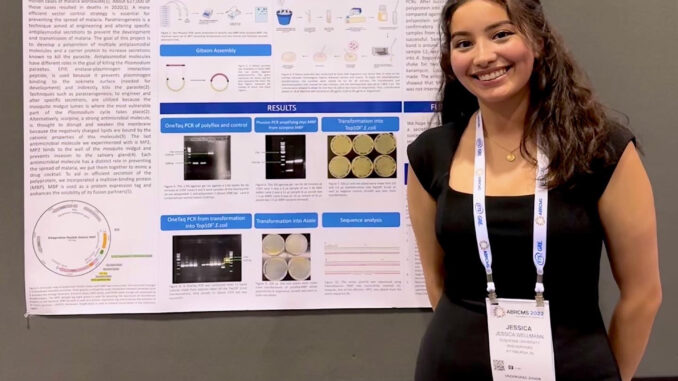
Isabella Abbott | Features Editor
Jan. 12, 2023
Last November, two Duquesne biology students attended the Annual Biomedical Research Conference For Minorized Students (ABRCMS) in Anaheim, Calif., after their many successes that came from summer research projects.
The conference was held for four days and was originally created to encourage first-generation, minority, veteran and disabled students to pursue higher education in STEM. Now, it’s one of the biggest professional conferences for underrepresented scientists in their educational passage.
Both Jessica Wellmann and Austin Summers were encouraged to present at this year’s conference after being emailed information and travel awards that would cover expenses.
Wellmann accepted her award from a combination of the biology department and the dean of the Bayer School of Natural and Environmental Sciences here at Duquesne. Although Summers is a student at Duquesne, he received his award from a professor at the University of Rochester, where he conducted his research.
While they both worked on different projects at different locations this summer, they were able to come together to represent Duquesne.
Wellmann’s research focused on trying to halt the spread of malaria, a serious disease in which a parasite is transmitted by the bite of infected mosquitos.
“In simple terms, the lab focuses on ways to prevent the spread of malaria that is spread by the bite of infected females,” Wellmann said. “We were just trying to figure out ways to either directly or indirectly kill the parasite before it can even be transmitted to a human.”
Summers’ research was focused on making different biomaterials that can be used in the human body for benefit.
“My project was trying to generate different compounds for easier delivery,” Summers said.
Summers and Wellmann presented for about an hour each during the conference’s final days, allowing them to showcase their summer projects to many researchers, young and old.
“People would come up to your poster and ask you questions,” Wellmann said. “So either graduate students in their fifth or sixth year, and then research professors from other universities, so it was a really good networking opportunity.”
More than 5,500 individuals were in attendance this November, including more than 900 exhibitors, 1,084 program directors, researchers and administrators, 667 graduate students and postdoctoral scientists and just under 3,000 community college, undergraduate and post baccalaureate students.
They were both more than appreciative to be there with the thousands of other students, researchers and professors.
“It was really fun getting to meet new people and different professors, also, having them talk about their own research,” Summers said.
Wellmann agreed and said they were lucky to have been chosen to go, especially since it’s very competitive.
“It was definitely a once-in-a-lifetime opportunity,” Wellmann said. “Most people don’t even go to conferences until they’re in their graduate programs, so it was really nice that we got to be able to show the work we’ve done with our labs. You also meet students from other universities, so that was really cool.”
Not only were they able to showcase their research to others, but during the event, they were able to attend different seminars focused on career development and Ph.D. application advice.
They received lots of information from those who were once in their shoes, trying to apply for Ph.D. opportunities and programs.
“Some of the seminars were career-development based, and some helped you decide what you want to do,” Wellmann said. “Then, there are representatives who came and talked about their work within it.
“There were also seminars from professors of other universities that covered basically every field within science, and a lot within biology.”
Summers said he saw and participated in various seminars focused on general research.
“Other seminars were general research-based seminars … Kind of giving students a spiel of what their research is in their lab,” Summers said.
Summers and Wellmann gave advice to any students looking to present their research at the ABRCMS in the future.
“Start early,” Summers said. “Don’t do the application last minute like I did.”
“Apply to as many things as you possibly can,” Wellmann said. “I mean, we were really lucky that we got the first thing we applied to, but usually it’s a lot of trial-and-error.”
